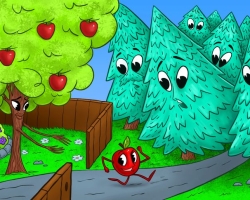How to teach a child to communicate with surrounding people. What games to play for the development of socio-communicative skills.
Content
- Development of socio-communicative skills of children
- The development of communicative skills of children in the family
- Knowledge of rules and norms when communication
- How to arouse in a child a desire to communicate?
- Video: How to teach a child to communicate with peers?
- How to teach a child the ability to organize communication?
- The development of communicative skills in young children: games and exercises
- The development of communicative skills in preschool children: games and exercises
- The development of communicative skills of older preschool children: games and exercises
- Video: How to raise a sociable child?
In the course of socio-communicative development, the child assimilates the norms of communication with surrounding people, joins the traditions and culture of society, learns to behave correctly in certain situations.
Development of socio-communicative skills of children
The main goal in socio-communicative development is the education of speech culture, a friendly attitude towards people, and education.
Modern society requires confident personalities that can improve and develop. If you look at the problem globally, then our children should be brought up so that the country is morally and spiritually developing.
Responsibility for raising the above qualities in a child rests with the family and educational institutions. The personality qualities of a person are laid in the first years of life. And how positive the results will be depends on parents, educators and teachers.

The development of communicative skills of children in the family
The very first visual experience of communication children acquire in the family. The child learns to understand how and cannot be done.
Moreover, the process is unconscious not only for the baby, but also for adult family members. The family simply realizes its daily communication with the child, thus showing him an example. Communicating with the members of his family, the child becomes like them in the manner of communication, gestures, facial expressions, and behavior.
There are two models of behavior in the family:
- If parents communicate with each other with respect, kindness, then this will positively affect the future on the worldview of the child. It is wonderful when parents and other family members take care of each other, talk affectionately, help, have common interests. One physical care for the baby is not enough. Parents also require emotional participation in the baby’s life - affectionate communication, support, kind game, trust
- Unfortunately, in some families an aggressive or insincere atmosphere reigns. Too restrained emotional style of communication also negatively affects the further positive adaptation of the child. It is bad when parents talk with their child in a dry or sharp tone, shout at him, scold for oversights, constantly pull, are indifferent to his successes. Often parents replace live communication with expensive toys, computer, gifts. This approach also carries negative consequences
In the first case, a safely socialized child grows up. He rarely becomes the culprit of the conflict. And if it suddenly falls into conflict situations, then it easily finds a solution. In addition to friendly communication with others, the child is able to cope with his internal experiences.
In the second case, a personality grows that is unable to establish contact with other people. The child begins to show aggression, to be wary of other children, learns to lie and cunning. This gives him a lot of psychological experiences with which he does not know how to cope.

Knowledge of rules and norms when communication
While the child does not attend a preschool institution, difficulties in the manner of communication may not seem significant. But when the child begins to go to kindergarten, difficulties are found. Conflicts with peers can be resolved with the use of power, bad words.
It is desirable that, until the moment of visiting the kindergarten, parents bring to the child knowledge of the rules of communication and behavior. Educators in the garden also actively work with children.
From childhood, teach the child to generally accepted rules of communication:
- Use the words of politeness when necessary. Words of politeness: Thank you, please I'm sorry. They need to be used not only when communicating with adults, but also when communicating with peers
- Greet with friends at a meeting and saying goodbye. Eye contact, smile, polite greeting is an obligatory part of etiquette. Without words of greeting and farewell, it is impossible to build polite relationships. Teach the child to these basics
- Do not touch other people's things. If the child wants to take someone else's toy, he must ask the owner permission. Also accustom the child to calmly perceive the refusal
- Not greedy. Teach your child to share toys, sweets if he plays (eats) in the team. At the same time, you need to make sure that the child shares it without detriment
- Do not talk about people badly in their presence. Children should understand that ugly ridiculed the physical disabilities of other people, as well as humiliate their peers

How to arouse in a child a desire to communicate?
All children are different. Watch them on the playground and you yourself can see how different children of the same age can be. There are conflicting children, there are shy, closed, restless. The character of the child is determined by his temperament.
In order not to deprive the child’s desire to communicate with other children, you need to take into account his temperament. In this case, you need to organize communication in such a way that the child and others feel as comfortable as possible.
How to encourage a desire to communicate in children with different characters:
Shy child
- Expand the circle of his dating
- Invite familiar children to visit
- Do not try to do everything yourself instead
- Attract him to tasks, where he will have to ask something, give, take
- Try to instill in the baby self -confidence and your own
Conflict child
- Hold the child in the desire to "arrange a storm"
- No need to blame another child, but justify your own
- After the incident, talk to your child, indicate the wrong actions
- You do not always need to intervene in conflicts. There are situations when children themselves must learn to give in to each other
A restless child
- Do not indulge in all whims of the baby, but do not deprive him of completely freedom of action
- Show a good example with your own restrained behavior
- Do not let your child feel forgotten, at the same time teach him to understand that he should not always be in the spotlight
Closed child
- Show an example of active communication on your experience. Let the child see that communicating with others is great, fun
- Invite guests to yourself, make new acquaintances with children
- Tell the baby that communication brings a lot of interesting and useful

Video: How to teach a child to communicate with peers?
How to teach a child the ability to organize communication?
Children of the first years of life play nearby, but not together. By the age of 3-4, a common organized game appears. So that other children are interested in playing with your child, he must have the following qualities:
- Be able to hear the interlocutor
- Sympathize, support, help
- To be able to resolve conflicts
Support the child’s desire to communicate and make friends with children, given his temperament. Send it, explain the rules of the game and the situation. More often play with your children at home.

The development of communicative skills in young children: games and exercises
The game is the main means of forming a child of ideas about life and relationships.
From an early age, children should learn to distinguish between people's feelings on examples of the heroes of the game.
For example, the game "How Masha does?"
You ask the child a question and give an answer to facial expressions. The child will learn to distinguish between emotions and feelings.
- How does Masha cry?
- How does Masha laugh?
- How is Masha angry?
- How does Masha smile?
Games with young children should be directed at:
- Development of goodwill for people
- Negative to greed and evil
- Elementary idea of \u200b\u200bthe concepts of "good" and "bad"

The development of communicative skills in preschool children: games and exercises
The game "Give a smile"
For this game, you need at least two participants. Ask the child to give your ally the most expensive and good smile. Thus, children share smiles and positively treat each other.
The game "The bird's wings hurts"
One child imagines himself a bird with a wounded wing, the rest try to console the bird, tell her kind words.

The development of communicative skills of older preschool children: games and exercises
The game "Polite words"
Children are in a circle. Everyone throws the ball to another. Before the throw, the child must say any polite word (thanks, good afternoon, sorry, please, to the dating).
Games-situations
Invite the child to resolve an independent situation on his own:
- Two girls quarreled - try to reconcile them
- You came to the new kindergarten - get acquainted with everyone
- You found a kitten - pity it
- You have friends at home - introduce them to your parents, show your home
The development of communicative skills is the path to a full -fledged life full of vivid impressions and events. Loving parents want to see their child happy and successful. Help him adapt in society. The sooner you begin to instill in the child socio-communicative skills, the easier it will be for him to find a common language with others.







